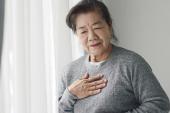Takotsubo Trigger Type Matters, With Physical Shocks Linked to Worse Outcomes
An analysis of the GEIST registry makes the case that pinpointing the triggering incident might help to inform care.

Physical triggers, rather than emotional shocks, appear to carry a worse prognosis and a higher risk of recurrence for Takotsubo cardiomyopathy, according to a new analysis of the German-Italian-Spanish Takotsubo (GEIST) registry.
Writing in a recent issue of the Journal of the American Heart Association, Toni Pätz, MD (University Heart Center, Lübeck, Germany), and colleagues say their findings make a strong case for considering the type of trigger in managing these patients.
“In this large international, multicenter registry trial, patients with an emotional trigger of Takotsubo syndrome had better clinical baseline conditions and a lower rate of in-hospital complications compared with patients with physical triggers or no trigger,” they write. “In addition, patients with emotional triggers also had lower long-term mortality rates compared with patients with physical triggers or no trigger.”
To TCTMD, Pätz said that “patients with a physical trigger or no triggers of Takotsubo syndrome may require a higher level of awareness during the hospitalization and in outpatient care.”
In the past, Takotsubo syndrome was viewed as a relatively innocuous form of acute heart failure, with overall good prognosis, although recent studies have documented that the condition may not be benign or a one-off event. A prior analysis of the GEIST registry highlighted worse outcomes in men, regardless of trigger type, both during the acute phase and longer term.
GEIST itself is a population-based, observational registry of 2,492 patients hospitalized with Takotsubo from 2017 onwards. In the current analysis, an emotional trigger (both negative and happy emotions) was identified as the precipitating event in 910 patients and a physical trauma in 885. No trigger could be identified in 717 patients, who nevertheless had the telltale signs of acute heart failure with impaired regional left ventricular contractility despite the lack of a corresponding coronary stenosis.
Patients with emotional triggers were more likely to be women, to be younger, and to have a lower prevalence of comorbidities. Adverse in-hospital events as well as long-term mortality, however, were significantly less common among people whose condition was triggered by an emotion, as compared with people whose triggers were physical and those whose triggers could not be identified.
Among the negative emotional triggers, said Pätz, interfamily disputes were frequently documented. In addition, the death of a relative can also be a possible cause of Takotsubo syndrome.
Increasing age, male sex, diabetes, malignancy, and a neurological disorder were all associated with a higher risk of long-term mortality following a Takotsubo diagnosis, whereas treatment with an ACE inhibitor or ARB, as well as presence of chest pain, were associated with a lower risk of dying in the long term.
“While former studies were mainly based on the idea of a ‘broken heart syndrome,’ caused by a negative emotional event, recent trials also [highlight] the importance of positive emotional events as triggers of Takotsubo as well as physical events and patients without any identifiable trigger,” the authors write. “In this context, patients with emotional triggers seem to have a better prognosis compared with patients with other causes for the occurrence of Takotsubo syndrome. Nevertheless, the reason for the difference in mortality remains unclear.”
One of the strengths of the new study is that it’s multinational, said Pätz, noting that former studies have typically focused on a single country. The advantage of such a large, international cohort is the ability to look at predictors of in-hospital complications and recurrence rates of Takotsubo syndrome, which previous studies were unable to do. Here, the rate of Takotsubo recurrence was 3.7% at a median of 824 days.
Shelley Wood was the Editor-in-Chief of TCTMD and the Editorial Director at the Cardiovascular Research Foundation (CRF) from October 2015…
Read Full BioSources
Pätz T, Santoro F, Cetera R, et al. Trigger-associated clinical implications and outcomes in takotsubo syndrome: results from the multicenter GEIST Registry. J Am Heart Assoc. 2023;12:e028511.
Disclosures
- Pätz reports having no relevant conflicts of interest.





Comments